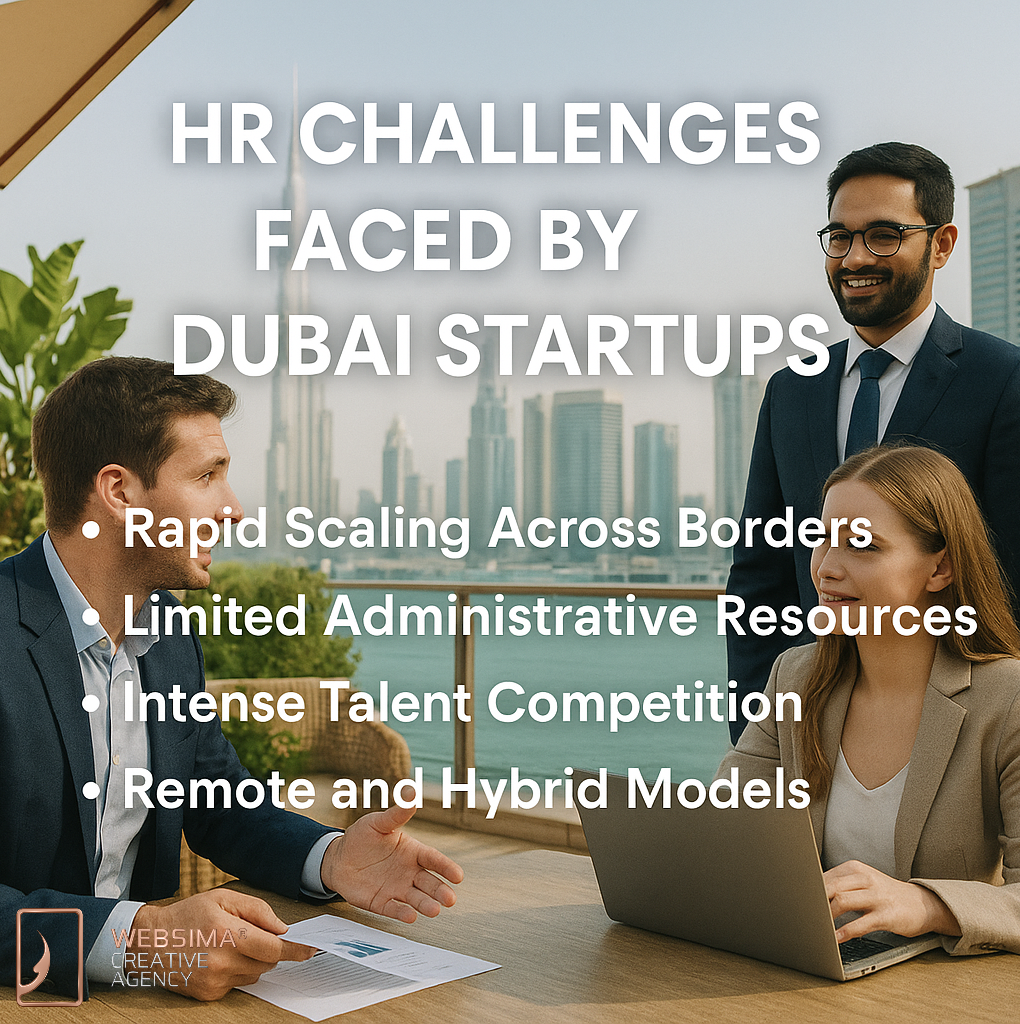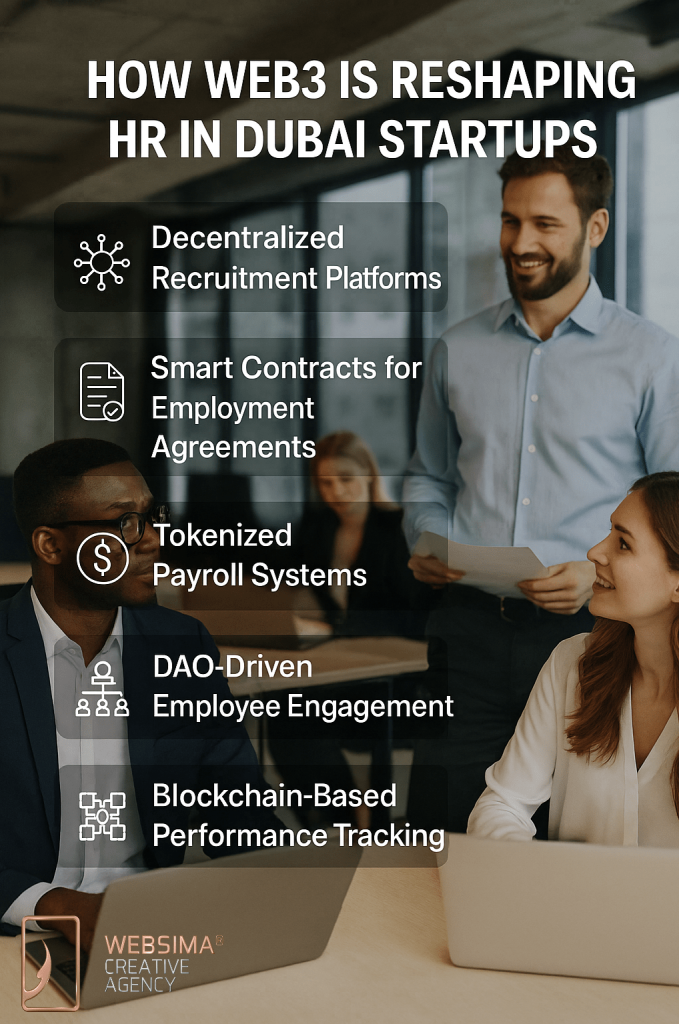Introduction
Dubai’s startup ecosystem thrives on rapid innovation, global talent, and business-friendly regulations. The city has positioned itself as a hub for technology-driven ventures, from fintech disruptors to AI-based service providers. Now, another powerful force is shaping the future of work — Web3 for Dubai startups HR.
Web3 introduces a decentralized, blockchain-powered approach to human resources, offering solutions that go beyond traditional HR software. In Dubai, where startups often operate in fast-moving markets and hire talent from across the globe, Web3-enabled HR systems are becoming invaluable. These systems can streamline recruitment, automate payroll in multiple currencies, ensure secure employee data management, and boost engagement through decentralized governance models.
This transformation isn’t just about adopting new tools — it’s about redefining the entire employer–employee relationship in a city that aims to be the capital of the global digital economy. In this in-depth article, we’ll explore exactly how Dubai startups are using Web3 to revolutionize HR, the opportunities and challenges involved, and how you can strategically adopt these innovations.
NEW: Sui partners with Dubai’s VARA to support startups, develop local talent, and provide regulatory guidance for Web3 innovation in the Middle East. pic.twitter.com/hZqbHZL3IU
— Cointelegraph (@Cointelegraph) June 5, 2025
The HR Challenges Faced by Dubai Startups

Rapid Scaling Across Borders
Dubai’s startups often expand across the GCC, MENA, and beyond within months. This expansion brings varied labor laws, currency issues, and the complexity of managing international teams — all of which can bog down HR departments.
Limited Administrative Resources
Early-stage startups run lean. With small teams, HR often falls to founders or operational managers, making automation critical to prevent bottlenecks.
Intense Talent Competition
With Dubai attracting multinational corporations, startups face fierce competition for top-tier developers, marketers, designers, and blockchain specialists.
Remote and Hybrid Models
Many Dubai startups now operate remotely, hiring globally. This creates challenges in payroll, benefits administration, and employee engagement across time zones.
How Web3 Is Reshaping HR in Dubai Startups

Web3’s decentralized architecture introduces solutions that directly address the above challenges, particularly for agile, globally connected companies.
Decentralized Recruitment Platforms
Blockchain-based recruitment platforms store verified credentials — education, work history, certifications — on-chain. This allows hiring managers to instantly confirm authenticity, reducing fraud and saving weeks of verification time.
Dubai Use Case:
A fintech startup in DIFC used a blockchain recruitment tool to hire a compliance officer from Singapore. All credentials were verified on-chain, cutting hiring time by 50%.
Notable platforms:
- HireChain – Specializes in verified developer recruitment.
- LaborX – Connects blockchain-skilled freelancers with global employers.
Smart Contracts for Employment Agreements
The future of on-chain employment contracts in UAE ties to smart contracts and Web3. Smart contracts allow employment terms to be written into code, automating salary releases, milestone-based bonuses, and end-of-contract settlements.
Example in Practice:
A Dubai-based blockchain consultancy hires remote developers in Eastern Europe. The employment agreement is deployed as a smart contract on Ethereum. Once each project milestone is approved, payment in USDC is released automatically, with no manual processing.
This approach reduces disputes, accelerates payment, and builds trust — crucial for remote teams.
Tokenized Payroll Systems
Web3 payroll platforms enable payment in cryptocurrencies, stablecoins, or a hybrid of fiat and tokens.
Advantages for Dubai Startups:
- Speed: Instant settlement compared to cross-border bank transfers
- Lower Fees: Reduced remittance costs
- Flexibility: Employees can choose to hold tokens or convert to fiat
- Equity Incentives: Startups can issue native tokens as performance-based bonuses, creating long-term loyalty
A Dubai gaming startup, for instance, pays part of its developers’ salaries in stablecoins and rewards high-performing team members with governance tokens, allowing them to vote on game development priorities.
DAO-Driven Employee Engagement
Decentralized Autonomous Organizations (DAOs) offer a governance model where employees participate in company decisions through token-based voting.
Practical Example:
A Dubai creative agency operates as a DAO. Each employee holds governance tokens that let them vote on:
- Marketing campaign concepts
- Office location changes
- Allocation of training budgets
This not only boosts morale but also strengthens retention by giving employees a real stake in outcomes.
Blockchain-Based Performance Tracking
Instead of storing performance reviews on private HR servers, blockchain allows records to be immutable, transparent, and easily verifiable.
Benefits include:
- Eliminating disputes over performance-related bonuses
- Giving employees portable records they can share with future employers
- Creating trust in performance-based promotions
Benefits of Web3 Integration for Dubai Startup HR
- Efficiency: Automates hiring, payroll, and compliance tasks
- Transparency: Immutable blockchain records prevent disputes
- Security: Strong cryptography reduces fraud and data breaches
- Global Reach: Pay and recruit from anywhere without banking barriers
- Employee Engagement: DAO participation fosters ownership mentality
- Compliance-Ready: Transparent systems help with audits and labor law checks
Regulatory Environment in the UAE
The UAE legal framework for DAO, blockchain and Web3 is evolving. The UAE — particularly Dubai — has taken a progressive approach to blockchain regulation. The Virtual Assets Regulatory Authority (VARA) oversees virtual asset activities in the emirate, providing clear frameworks for compliance.
Key Points for Startups:
- Payroll in tokens may require licensing if tokens are classified as regulated virtual assets.
- Smart contract platforms must adhere to UAE labor laws in addition to blockchain regulations.
- Tokenized equity or governance tokens should comply with securities laws if they represent company ownership.
Expanded Case Studies
Case Study 1: DAO-Based Marketing Agency
Operating from Dubai Internet City, this agency runs entirely as a DAO. Employees across five countries receive stablecoin salaries and governance tokens. They collectively vote on client acquisition strategies and profit distribution. As a result, the agency reports a 30% increase in retention.
Case Study 2: Smart Contract Payroll for Developers
A blockchain consultancy in DIFC pays its developers in USDC via smart contracts. Payroll is processed automatically upon project completion sign-off. This has cut payroll processing time from 10 days to a few hours.
Case Study 3: Tokenized Incentives for Employee Engagement
A Dubai edtech startup issues NFT-based certificates for employee achievements, redeemable for training programs or bonuses. This gamifies performance and boosts motivation.
Risks and Mitigation Strategies
- Volatility: Use stablecoins (e.g., USDC, USDT) for payroll to minimize currency risk.
- Regulatory Risk: Maintain regular compliance audits with VARA-licensed advisors.
- Tech Literacy: Provide onboarding and wallet security training to employees.
- Integration Costs: Start with hybrid models, integrating Web3 tools alongside existing HR systems.
Opportunities by Sector
| Sector | Web3 HR Opportunity | Example in Dubai |
| Fintech | Smart contract-based payroll | DIFC-based DeFi firms |
| Creative Agencies | DAO voting on projects | Dubai Design District agencies |
| Gaming | Tokenized bonuses and NFT perks | Game studios in Dubai Media City |
| Education | NFT-based employee credentials | E-learning startups in Knowledge Park |
Future Outlook
With Dubai investing heavily in its Metaverse Strategy and blockchain adoption, Web3 HR will likely become the default for startups within the next 5–7 years. The convergence of tokenized workspaces, AI-driven recruitment, and decentralized governance will redefine how companies attract, manage, and retain talent.
Your Strategic Partner for Web3 HR Transformation
Web3 is no longer a future concept — it’s the present reality for forward-thinking HR departments in Dubai startups. By integrating blockchain-based recruitment, tokenized payroll, and DAO governance, your startup can attract top talent, cut operational costs, and boost transparency.
At Websima, we help Dubai startups:
- Select the right Web3 HR tools
- Ensure VARA and labor law compliance
- Integrate smart contract payroll systems
- Build DAO-driven employee engagement models
Contact Websima today to future-proof your HR strategy. Let’s build a transparent, efficient, and empowered workplace for your team in Dubai — one that thrives in the Web3 era.





